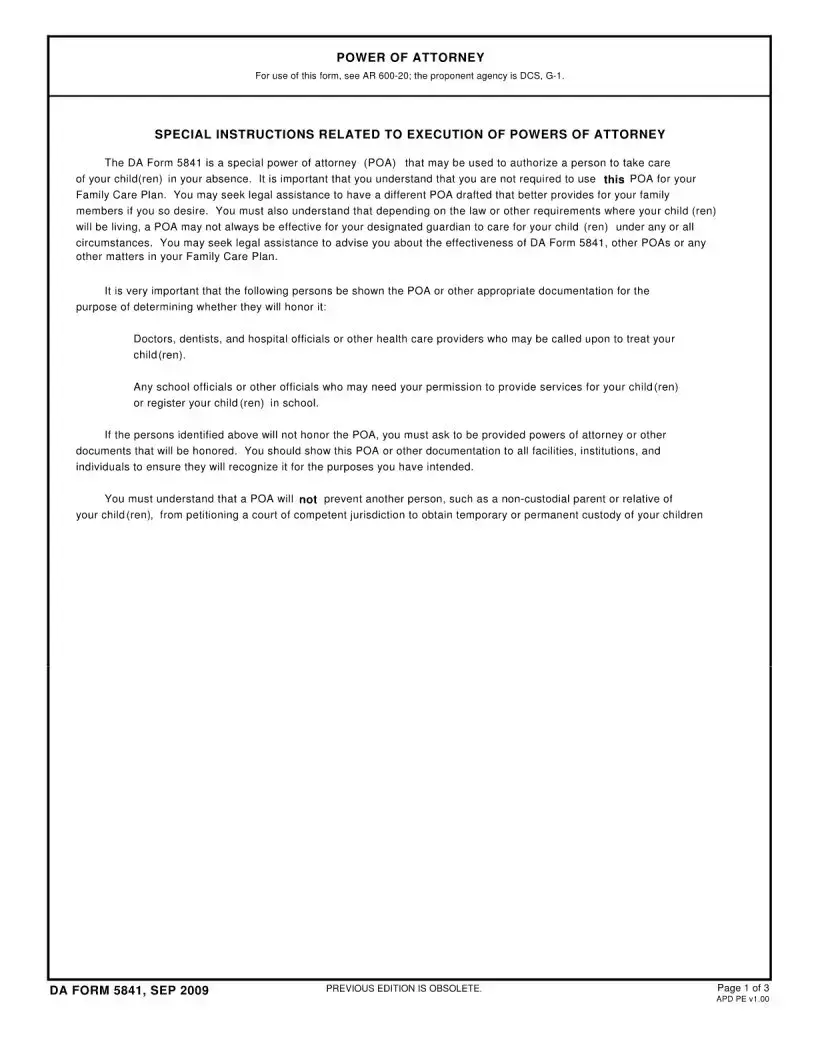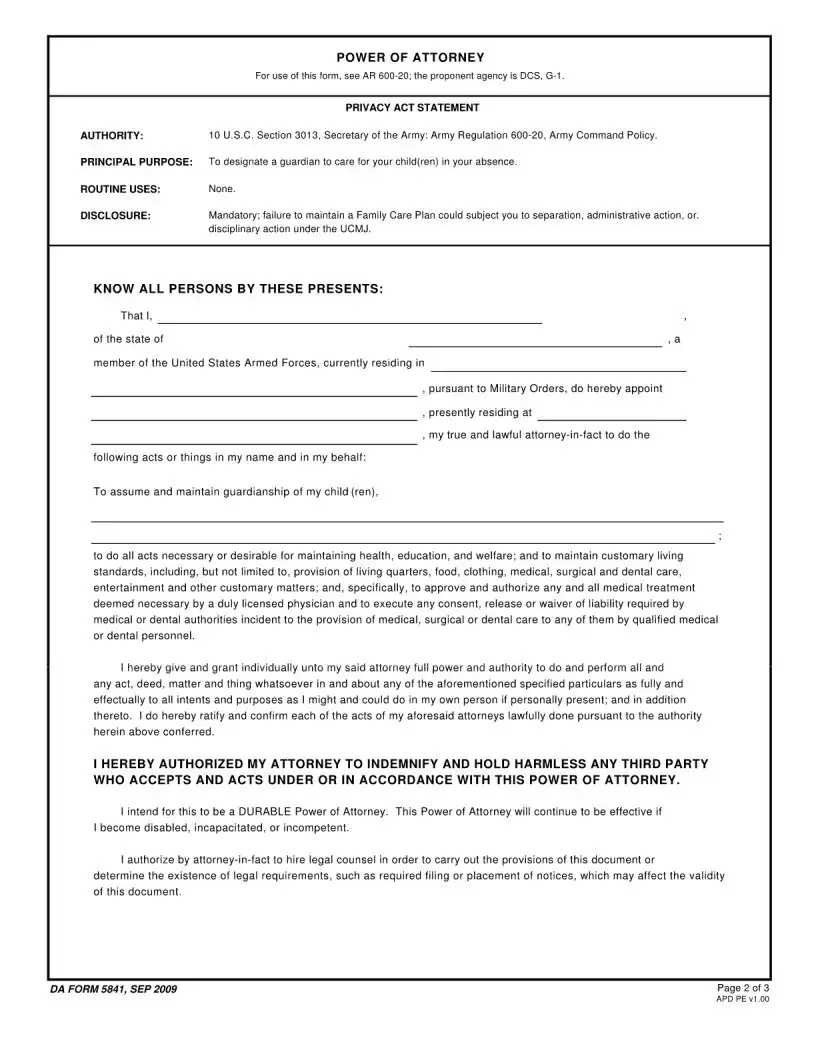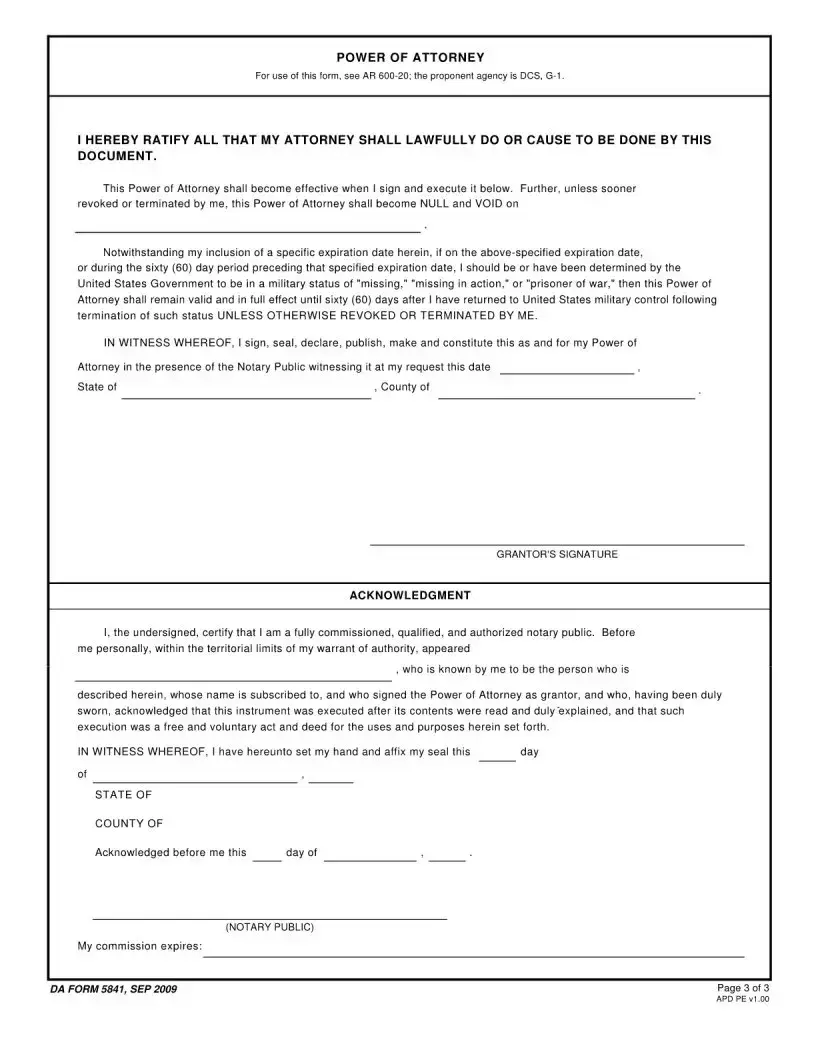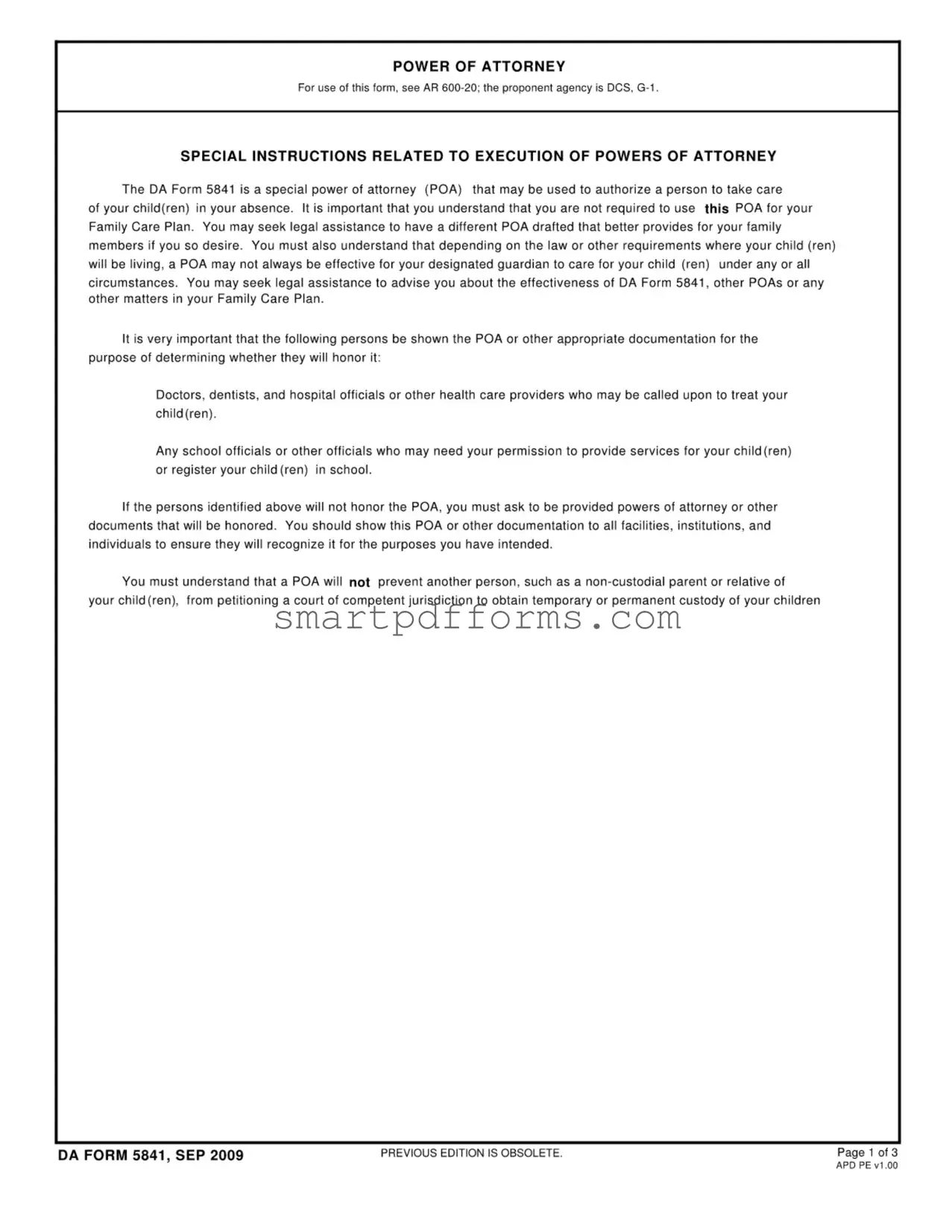Blank Da 5841 PDF Template
The DA Form 5841 is a crucial document within the United States Armed Forces, empowering service members to designate a guardian for their children during their absence. Drafted with precise attention to the needs of military personnel, this specialized Power of Attorney (POA) serves as an essential component of a Family Care Plan. It enables a service member to authorize a trusted individual to assume responsibility for the welfare, education, and overall upbringing of their child or children when military duties call them away. This form delves into specifics such as medical care authorization, ensuring that the appointed guardian has the legal authority to make significant decisions in the parent's stead. While its use is not mandated by military regulations for family care planning, the DA Form 5841 stands as a recommended option for those seeking a tailored solution that addresses the unique challenges faced by military families. The document’s design takes into account potential legal complexities by advising service members to seek legal counsel. This ensures that the POA is recognized and honored by educational, medical, and other institutions, thus safeguarding the child's well-being under various circumstances. Moreover, it explicitly addresses the durability of the POA, highlighting its continuous effectiveness even if the service member becomes disabled, incapacitated, or incompetent. With an understanding that circumstances such as deployment can rapidly change, the form also includes provisions for its validity in the event the service member is declared "missing," "missing in action," or a "prisoner of war." Ultimately, the DA Form 5841 embodies a comprehensive approach to ensuring that the children of America's service members receive proper care in their parent's absence, reflecting a balance between military readiness and family welfare.
Preview - Da 5841 Form



Form Data
| Fact Name | Description |
|---|---|
| Form Purpose | The DA Form 5841 is a Power of Attorney (POA) form designed to designate a guardian to care for children in the absence of the parent(s), particularly for members of the United States Armed Forces. |
| Governing Regulation | This form is governed by AR 600-20 and the proponent agency is the Deputy Chief of Staff, G-1. |
| Principal Purpose | Its principal purpose is to ensure that military personnel can appoint someone they trust to take care of their child(ren)'s health, education, and welfare during their absence. |
| Authority and Disclosure | The form derives its authority from 10 U.S.C. Section 3013, Secretary of the Army: Army Regulation 600-20, Army Command Policy, with disclosure being mandatory to avoid potential administrative or disciplinary action under the Uniform Code of Military Justice (UCMJ). |
Instructions on Utilizing Da 5841
Filling out the DA Form 5841, a special Power of Attorney (POA), is a critical step for members of the United States Armed Forces who are planning for the care of their children in their absence. This document allows you to appoint a trusted individual to assume guardianship responsibilities for your child or children, ensuring they remain in safe hands while you are away. It's a straightforward process but requires attention to detail to ensure the appointed guardian can legally act on behalf of your child(ren). Here’s a step-by-step guide to completing the DA Form 5841.
- Start by reading the Special Instructions on the first page to understand the form’s scope and its implications thoroughly.
- In the section titled "KNOW ALL PERSONS BY THESE PRESENTS," fill in your full name and state of residence in the space provided.
- Indicate your current residential address and your status as a member of the United States Armed Forces.
- Appoint your attorney-in-fact by entering the name of the person you are designating as guardian for your child(ren), along with their current residential address.
- Specify the child or children under the guardianship arrangement by listing their name(s) in the provided space.
- Review the powers you are granting to your attorney-in-fact, which cover a wide range of activities necessary for the well-being of your child(ren), including medical treatment and educational matters. Ensure you are comfortable with these provisions.
- Acknowledge your understanding and agreement with the terms by granting your attorney-in-fact the authority to act on your behalf. This is indicated by the statement of intent towards the end of the form.
- Confirm that the POA is a Durable Power of Attorney, meaning it remains in effect even if you become disabled, incapacitated, or incompetent.
- Sign and date the form in the presence of a Notary Public on the designated line at the bottom of the third page.
- Ensure the Notary Public completes the Acknowledgment section, which includes their official seal, signature, and the date of notarization.
After completing the DA Form 5841, keep a copy for your records and provide the original to your appointed attorney-in-fact. It's also wise to share copies with relevant institutions or individuals, such as schools and healthcare providers, to ensure they acknowledge and accept the POA. Remember, this form is an essential part of your Family Care Plan and helps protect your child(ren)'s interests in your absence.
Obtain Answers on Da 5841
FAQ about DA Form 5841
- What is DA Form 5841?
- Is it mandatory to use DA Form 5841 for my Family Care Plan?
- What should I do if healthcare providers or school officials will not honor the DA Form 5841?
- Can someone challenge the guardianship established under DA Form 5841?
- When does the DA Form 5841 become effective, and how long does it last?
DA Form 5841 is a special Power of Attorney (POA) document that allows a member of the United States Armed Forces to appoint someone as their attorney-in-fact. This designation authorizes the appointed individual to assume guardianship of the service member's child(ren) in their absence. This form is particularly useful for ensuring the health, education, and welfare of the child(ren) are maintained while the service member is away due to military orders.
No, it's not mandatory to use DA Form 5841 for your Family Care Plan. While this form may serve as a useful tool in outlining arrangements for your child(ren)'s care, you are free to seek legal assistance to draft a different Power of Attorney document that better suits your family's needs. It's essential to consider the legal effectiveness of any POA document you choose to use, especially regarding the specific laws and requirements of the location where your child(ren) will reside.
If you encounter any healthcare providers, school officials, or other relevant authorities who will not honor the DA Form 5841, you should seek alternative documents they are willing to accept. This might involve obtaining different forms of POA or alternate legal documentation. Always ensure that any document you plan to use is shown to and accepted by all necessary facilities, institutions, and individuals to fulfill your intended purposes.
Yes, DA Form 5841 does not prevent another individual, such as a non-custodial parent or a relative, from petitioning a court for temporary or permanent custody of your child(ren). The legal scope of DA Form 5841 and its protections can be circumvented or challenged in court, highlighting the importance of ensuring your Family Care Plan and associated POA documents cater to your unique family dynamics and legal contexts.
DA Form 5841 becomes effective upon the service member's signing and execution of the document. It includes a section where the service member can specify an expiration date. However, in unique circumstances where the service member is declared "missing," "missing in action," or a "prisoner of war," the form remains valid until sixty days after their return to United States military control, unless otherwise revoked or terminated by the service member beforehand.
Common mistakes
Filling out the DA Form 5841, a special power of attorney (POA) related to the care of children in the absence of their parents, is crucial, especially for members of the United States Armed Forces preparing for deployment or for any reason that may separate them from their children for an extended period. It's important to avoid common mistakes to ensure that the POA accurately reflects the parent's wishes and can be relied upon when needed. Here are nine frequent errors to watch out for:
Not Providing Complete Information: Omitting details about the guardian or the children can lead to confusion and might render the POA ineffective for its intended purposes.
Failing to Specify Powers Clearly: The POA should clearly outline what the appointed guardian can and cannot do. Vagueness can lead to legal complications.
Overlooking the Need for Durability: Ensuring the POA is durable means it remains in effect even if the grantor becomes incapacitated. Not specifying this can limit its usefulness.
Inaccurate Legal Information: Misunderstanding the legal requirements, such as filing or notice placement, might invalidate the POA or restrict its enforcement.
Not Discussing the POA with the Designated Guardian: The designated guardian should be fully informed and agreeable to their responsibilities as outlined in the POA.
Failure to Consider State Laws: Each state has different laws regarding POAs. Not tailoring the POA to comply with state laws where the child will reside can make it ineffective.
Lack of Witnesses or Improper Notarization: Failing to have the POA properly witnessed or notarized can lead to questions about its authenticity and enforceability.
Ignoring the Expiration Date: Not setting an appropriate expiration date, or misunderstanding how it works in cases of the grantor being missing in action, can create legal ambiguities.
Not Providing Copies to Relevant Parties: Neglecting to distribute copies of the POA to schools, healthcare providers, and others who need it to act on the child's behalf limits its effectiveness.
Ensuring that all aspects of the DA Form 5841 are correctly addressed helps safeguard the interests of the children it is designed to protect, making clear legal arrangements for their care in the grantor's absence.
Documents used along the form
When handling legal matters, such as arranging for the care of your child in your absence, the DA Form 5841 is a crucial document. This form is a special kind of power of attorney (POA) designed specifically for members of the United States Armed Forces, allowing them to appoint someone to take care of their child(ren) while they are away. However, to ensure all aspects of the caregiving arrangement are covered and legally sound, several additional forms and documents are often used alongside the DA Form 5841. Understanding these documents can help in creating a comprehensive family care plan.
- DA Form 5305: Family Care Plan. This form is used in conjunction to outline the specifics of how dependents will be cared for in the service member's absence. It’s a requirement for service members who have dependents.
- DA Form 7666: Parental Consent. This form is necessary when both parents are not deploying but one is granting consent for the other to execute a family care plan.
- DD Form 1172-2: Application for Identification Card/DEERS Enrollment. Essential for ensuring dependents continue to have access to military benefits like healthcare and commissary privileges in the service member's absence.
- DD Form 137-3: Dependency Statement – Parent. Used to establish the dependency of a parent, which is necessary for certain legal and care arrangements.
- DD Form 2558: Authorization to Start, Stop or Change an Allotment. This allows service members to manage financial allotments for dependents or caregivers directly from their pay.
- SSA-3288: Social Security Administration Consent for Release of Information. Enables the appointed caregiver to access necessary social security information and benefits for the child.
- Healthcare Proxy or Advanced Medical Directive: A legal document that specifies healthcare preferences and designates someone to make medical decisions on behalf of the service member’s dependents in cases where they cannot make decisions themselves.
- School Authorization Form: Gives the designated caregiver the authority to make educational decisions and take actions related to the schooling of the child(ren).
- Temporary Guardianship Agreement: A notarized agreement that provides temporary guardianship rights to the caregiver, often required by school districts and medical providers.
- Child Medical Consent Form: Authorizes the named caregiver to make medical decisions and seek medical treatment for the child in the service member's absence.
Using these forms in conjunction with the DA Form 5841 ensures a thorough and legally robust family care plan. They address a range of practical considerations, from healthcare and education to financial support and legal standing of the caregiver. It is advisable for service members to consult with a legal advisor to ensure they have all necessary documentation properly filled out and filed. This forward-thinking approach can provide peace of mind for military personnel and their families during deployments.
Similar forms
The General Power of Attorney form is similar to the DA Form 5841, as both designate an individual to act on the grantor's behalf. However, while the DA Form 5841 is more specific to the guardianship and care of children, the General Power of Attorney can cover a broader range of financial and legal decisions.
The Medical Power of Attorney shares similarities with the DA Form 5841, particularly in allowing an attorney-in-fact to make medical decisions. The DA Form 5841 includes provisions for medical and dental care of children, much like the Medical Power of Attorney, which allows someone to make healthcare decisions for the grantor if they become unable to do so.
The Durable Power of Attorney is akin to the DA Form 5841 in its durability. The DA Form 5841 is intended to be durable, meaning it remains effective even if the grantor becomes incapacitated. Similarly, a Durable Power of Attorney maintains its validity even if the grantor is no longer mentally competent to make decisions.
The Temporary Guardianship Agreement is comparable to the DA Form 5841 as both are used to grant another person the authority to care for and make decisions regarding children in the grantor's absence. However, the DA Form 5841 is specifically tailored for military personnel and includes more explicit consent for medical treatment and educational decisions.
Dos and Don'ts
When dealing with the DA Form 5841, a Power of Attorney (POA) for guardianship of children during absence, there are critical dos and don'ts to ensure the form is filled out correctly and efficiently. These guidelines will help you navigate the process smoothly.
- Do thoroughly read the instructions and special instructions related to the execution of powers of attorney provided with the form.
- Do consult with a legal advisor if you have questions about the form or if you need personalized advice regarding your family care plan.
- Do ensure the person you appoint as your attorney-in-fact is someone you trust deeply with the care of your children.
- Do clearly state the authority you are granting to your attorney-in-fact, including any limitations you wish to place on their power.
- Don't overlook the requirement to have the form notarized. This is essential for the POA to be legally valid.
- Don't forget to provide copies of the completed and notarized form to relevant parties, such as doctors, dentists, and school officials, to ensure it will be honored.
- Don't assume the POA will prevent other individuals, like a non-custodial parent, from seeking custody through legal channels. Be prepared for this possibility.
- Don't use this form without considering state laws or the laws of the location where your children will be living, as they might affect the POA's effectiveness.
Taking these steps when filling out the DA Form 5841 will help safeguard your children's well-being in your absence and ensure that your appointed guardian has the authority they need to care for your children effectively.
Misconceptions
Misunderstandings about legal documents can complicate what should be straightforward processes. The DA Form 5841, a specialized Power of Attorney (POA) for military members, is no exception. Here are six common misconceptions about the DA Form 5841 and the truths behind them:
- It's the only option for military families. Many believe that the DA Form 5841 is the only form available to military personnel for the purpose of assigning a guardian for their children during their absence. However, this form is a specialized POA that may be used but is not mandatory. Military members are free to seek legal assistance to draft a different POA that better suits their family's needs.
- Its powers are unlimited. Some think this POA grants the appointed guardian unlimited powers over the care of children. In reality, the DA Form 5841 specifically outlines the powers granted to the attorney-in-fact, focusing primarily on maintaining the health, education, and welfare of the children.
- It’s effective under all circumstances. A common belief is that once completed, the DA Form 5841 is effective in all situations. However, its effectiveness can vary depending on the law where the child resides. It may not always empower the designated guardian to care for the child under every circumstance. Legal advice might be necessary to determine the best course of action.
- All institutions will honor it. There’s a misconception that schools, hospitals, and other institutions will automatically honor this POA. Yet, it's essential to verify acceptance with each institution. In instances where the DA Form 5841 is not recognized, other forms of documentation may be required.
- It prevents others from gaining custody. Some may mistakenly believe that issuing this POA prevents any other person, like a non-custodial parent, from obtaining custody of the child. The truth is, this form doesn't prevent others from petitioning a court for custody or guardianship of the children.
- It's difficult to revoke. There's an assumption that revoking the DA Form 5841 or terminating its powers involves a complex legal process. However, the principal (the person who granted the POA) can revoke it or terminate its powers at any time, provided they follow the necessary legal protocol to do so.
Understanding the DA Form 5841 and its implications is crucial for military members planning for their family's care in their absence. Dispelling these misconceptions ensures that families are better informed and can make decisions that best protect their interests and those of their children.
Key takeaways
Filling out and using the DA Form 5841, a special power of attorney (POA), involves several key considerations that are vital for the caretaking of one’s children in the parent’s absence. Understanding these takeaways helps ensure the document is used effectively:
- Designation of a Guardian: The DA Form 5841 is specifically designed to authorize someone you trust to care for your children in your absence. This includes maintaining their health, education, and welfare.
- Alternative Options: You are not obligated to use this particular form for your Family Care Plan. Other forms of POA can be drafted with legal assistance to better fit your and your family's needs.
- Legal Effectiveness: The effectiveness of the DA Form 5841 can vary based on location and law where the child will be living. It is important to consult legal assistance to ensure the POA will be honored as intended.
- Verification with Third Parties: It is critical to show the POA or other relevant documentation to doctors, dentists, school officials, and any other individuals who may need to provide services for your child. This ensures they will honor the document.
- Potential Limitations: Having a POA, including the DA Form 5841, does not prevent someone else, like a non-custodial parent, from seeking court intervention for custody or guardianship of your children.
- Durable Nature: The DA Form 5841 is intended as a durable power of attorney, meaning it remains in effect even if you become incapacitated, unless explicitly revoked or terminated by you.
- Effective Period: The form specifies that unless sooner revoked or terminated, it will become null and void on a date you choose, with exceptions if you are declared missing, missing in action, or a prisoner of war by the United States Government.
Understanding and properly utilizing the DA Form 5841 ensures that your children will be cared for according to your wishes during your absence, taking into account the varying legal implications and the need for widespread recognition of the document.
Popular PDF Forms
California Code of Civil Procedure 1008 - The form requires details such as the server's address, documents mailed, recipient, and mailing procedure, ensuring transparency.
Ilife Timesheets Printable - By providing the necessary framework for detailed and compliant timesheet submissions, the form supports the overall integrity and effectiveness of the IRIS program's compensation system.
Notice of Appearance New York Supreme Court - The civil court of the City of New York authorizes this form, centralizing its applicability to this jurisdiction.
